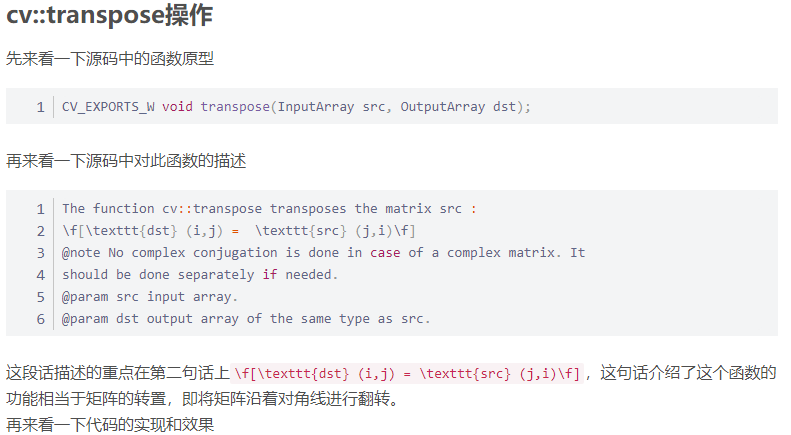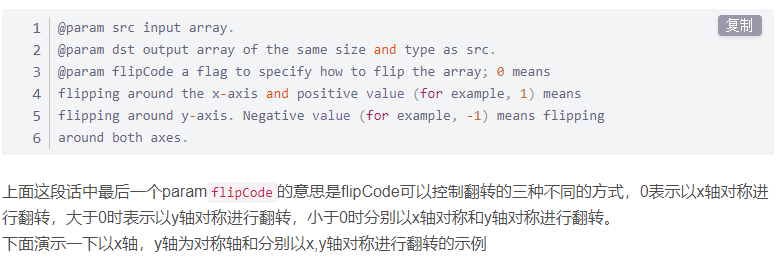OpenCv图像处理之resize(缩放)、transpose、rotate(旋转)、flip(翻转)介绍
OpenCv图像处理之resize(缩放)、transpose、rotate(旋转)、flip(翻转)介绍:
OpenCv图像处理之resize、transpose、rotate、flip介绍
cv::resize操作
cv::transpose操作
cv::rotate操作
cv::flip操作
cv::resize操作
缩放是处理图像中经常用到的方法,opencv中也专门封装了此类函数,就是cv::resize。
CV_EXPORTS_W void resize(InputArray src, OutputArray dst, Size dsize, double fx = 0, double fy = 0, int interpolation = INTER_LINEAR);
InputArray src输入图像cv::Mat类型
OutputArray dst输出图像cv::Mat类型
Size dsize缩放后的尺寸
double fx = 0x缩放比例,默认为0
double fy = 0y缩放比例,默认为0
int interpolation = INTER_LINEAR插值法,默认为双线性插值
再来看一个例子:
#include <opencv2/opencv.hpp> using namespace std; using namespace cv; int main() { Mat frame, clone_frame; frame = imread("D:/cat.jpg", 3); clone_frame = frame.clone(); cout << "front of the scale image.rows:" << clone_frame.rows << " " << "image.cols:" << clone_frame.cols << endl; double scale = 0.5; //放缩会导致图像失真,缩小时interpolation使用INTER_AREA,放大时使用INTER_LINEAR减少失真 resize(clone_frame, clone_frame, Size(int(frame.cols * scale), int(frame.rows * 0.5)), 0, 0, INTER_AREA); cout << "behind of the scale image.rows:" << clone_frame.rows << " " << "image.cols:" << clone_frame.cols << endl; imshow("resize_img", clone_frame); waitKey(0); return 0; }
front of the scale image.rows:745 image.cols:746 behind of the scale image.rows:372 image.cols:373
效果显示
注意使用resize进行缩放的时候,会出现图像失真问题,插值法有利于减少失真。
常见插值法


1 #include <iostream> 2 #include "opencv2/opencv.hpp" 3 4 using namespace std; 5 using namespace cv; 6 7 8 int main() { 9 Mat frame, clone_frame; 10 frame = imread("D:/cat.jpg", 3); 11 clone_frame = frame.clone(); 12 double scale = 0.5; 13 resize(clone_frame, clone_frame, Size(int(frame.cols * scale), 14 int(frame.rows * scale)), 15 0, 0, INTER_AREA); 16 transpose(clone_frame, clone_frame); 17 imshow("transpose_frame", clone_frame); 18 waitKey(0); 19 return 0; 20 }

cv::rotate操作
先来看一下源码种rotate的函数原型
1 CV_EXPORTS_W void rotate(InputArray src, OutputArray dst, int rotateCode); 2 enum RotateFlags { 3 ROTATE_90_CLOCKWISE = 0, //!<Rotate 90 degrees clockwise 4 ROTATE_180 = 1, //!<Rotate 180 degrees clockwise 5 ROTATE_90_COUNTERCLOCKWISE = 2, //!<Rotate 270 degrees clockwise 6 };
源码描述:
1 /** @brief Rotates a 2D array in multiples of 90 degrees. 2 The function cv::rotate rotates the array in one of three different ways: 3 * Rotate by 90 degrees clockwise (rotateCode = ROTATE_90_CLOCKWISE). 4 * Rotate by 180 degrees clockwise (rotateCode = ROTATE_180). 5 * Rotate by 270 degrees clockwise (rotateCode = ROTATE_90_COUNTERCLOCKWISE). 6 @param src input array. 7 @param dst output array of the same type as src. The size is the same with ROTATE_180, 8 and the rows and cols are switched for ROTATE_90_CLOCKWISE and ROTATE_90_COUNTERCLOCKWISE. 9 @param rotateCode an enum to specify how to rotate the array; see the enum #RotateFlags 10 @sa transpose , repeat , completeSymm, flip, RotateFlags 11 */
上面这段话大概意思就是rotate函数能够按照顺时针的方法以三种不同的角度进行旋转,三种角度分别是90度,180度,270度。rotateCode参数可以取枚举类型RotateFlags中的值,0表示90度,1表示180度,2表示270度
接下来我们使用cv::rotate来演示一下顺时针旋转180度的操作:
1 #include <iostream> 2 #include "opencv2/opencv.hpp" 3 4 using namespace std; 5 using namespace cv; 6 7 8 int main() { 9 Mat frame, clone_frame; 10 frame = imread("D:/cat.jpg", 3); 11 clone_frame = frame.clone(); 12 double scale = 0.5; 13 resize(clone_frame, clone_frame, Size(int(frame.cols * scale), 14 int(frame.rows * scale)), 15 0, 0, INTER_AREA); 16 cv::rotate(clone_frame, clone_frame, 1); 17 imshow("rotate_180_frame", clone_frame); 18 waitKey(0); 19 return 0; 20 }
效果显示


1 #include <iostream> 2 #include "opencv2/opencv.hpp" 3 4 using namespace std; 5 using namespace cv; 6 7 8 int main() { 9 Mat frame, clone_frame; 10 frame = imread("D:/cat.jpg", 3); 11 clone_frame = frame.clone(); 12 double scale = 0.5; 13 resize(clone_frame, clone_frame, Size(int(frame.cols * scale), 14 int(frame.rows * scale)), 15 0, 0, INTER_AREA); 16 //y 17 flip(clone_frame, clone_frame, 1); 18 //x,y 19 //flip(clone_frame,clone_frame,-1); 20 //x 21 //flip(clone_frame,clone_frame,0); 22 imshow("flip_y_frame", clone_frame); 23 waitKey(0); 24 return 0; 25 }
以y轴为对称轴
分别以x轴,y轴为对称轴
以x轴为对称轴






【推荐】国内首个AI IDE,深度理解中文开发场景,立即下载体验Trae
【推荐】编程新体验,更懂你的AI,立即体验豆包MarsCode编程助手
【推荐】抖音旗下AI助手豆包,你的智能百科全书,全免费不限次数
【推荐】轻量又高性能的 SSH 工具 IShell:AI 加持,快人一步
· 10年+ .NET Coder 心语 ── 封装的思维:从隐藏、稳定开始理解其本质意义
· 地球OL攻略 —— 某应届生求职总结
· 周边上新:园子的第一款马克杯温暖上架
· Open-Sora 2.0 重磅开源!
· 提示词工程——AI应用必不可少的技术